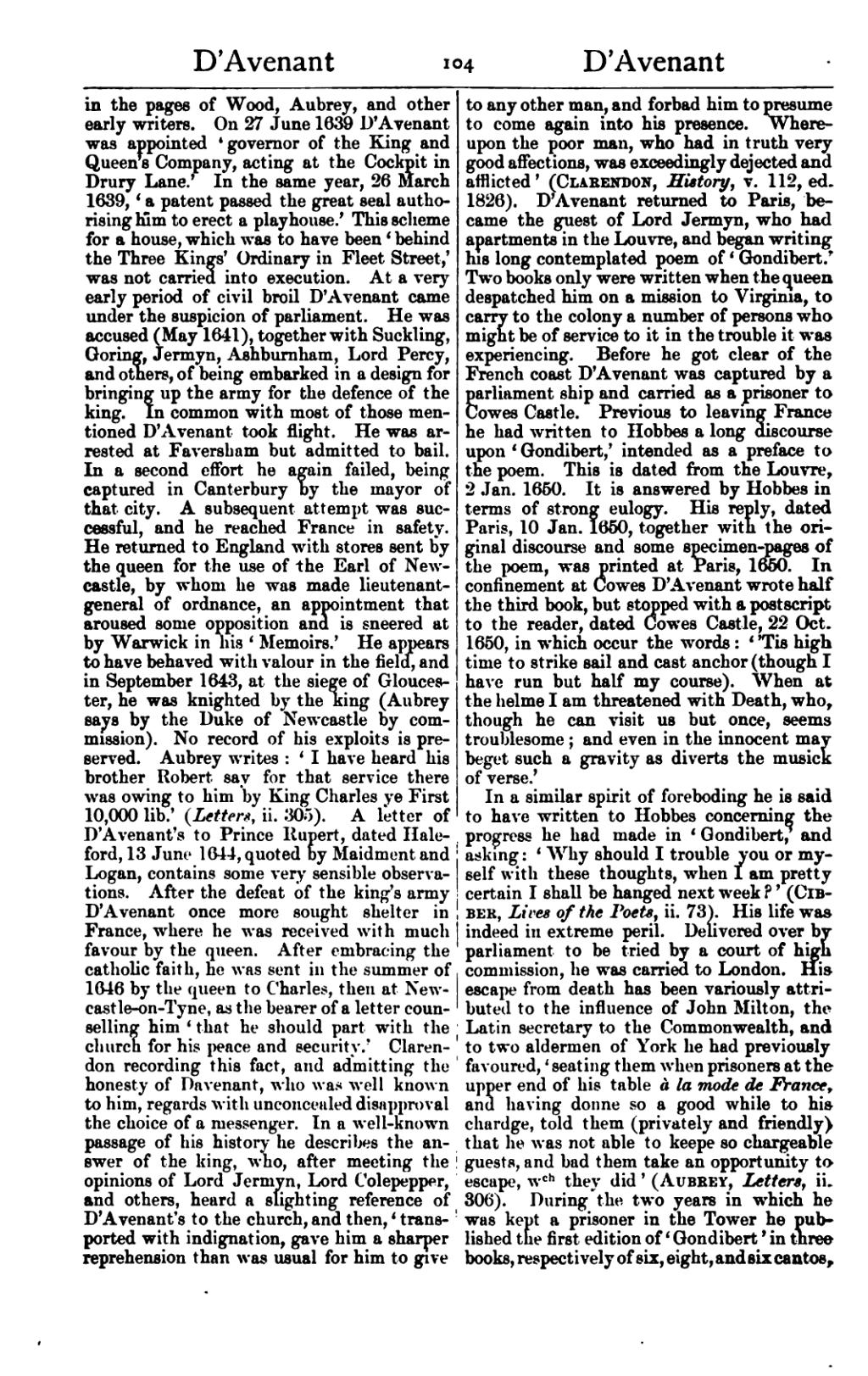in the pages of Wood, Aubrey, and other early writers. On 27 June 1639 D'Avenant was appointed ‘governor of the King and Queen's Company, acting at the Cockpit in Drury Lane.’ In the same year, 26 March 1639, ‘a patent passed the great seal authorising him to erect a playhouse.’ This scheme for a house, which was to have been ‘behind the Three Kings' Ordinary in Fleet Street,’ was not carried into execution. At a very early period of civil broil D'Avenant came under the suspicion of parliament. He was accused (May 1641), together with Suckling, Goring, Jermyn, Ashburnham, Lord Percy, and others, of being embarked in a design for bringing up the army for the defence of the king. In common with most of those mentioned D'Avenant took flight. He was arrested at Faversham but admitted to bail. In a second effort he again failed, being captured in Canterbury by the mayor of that city. A subsequent attempt was successful, and he reached France in safety. He returned to England with stores sent by the queen for the use of the Earl of Newcastle, by whom he was made lieutenant-general of ordnance, an appointment that aroused some opposition and is sneered at by Warwick in his ‘Memoirs.’ He appears to have behaved with valour in the field, and in September 1643, at the siege of Gloucester, he was knighted by the king (Aubrey says by the Duke of Newcastle by commission). No record of his exploits is preserved. Aubrey writes: ‘I have heard his brother Robert say for that service there was owing to him by King Charles ye First 10,000 lib.’ (Letters, ii. 305). A letter of D'Avenant's to Prince Rupert, dated Haleford, 13 June 1644, quoted by Maidment and Logan, contains some very sensible observations. After the defeat of the king's army D'Avenant once more sought shelter in France, where he was received with much favour by the queen. After embracing the catholic faith, he was sent in the summer of 1646 by the queen to Charles, then at Newcastle-on-Tyne, as the bearer of a letter counselling him ‘that he should part with the church for his peace and security.’ Clarendon recording this fact, and admitting the honesty of D'Avenant, who was well known to him, regards with unconcealed disapproval the choice of a messenger. In a well-known passage of his history he describes the answer of the king, who, after meeting the opinions of Lord Jermyn, Lord Colepepper, and others, heard a slighting reference of D'Avenant's to the church, and then, ‘transported with indignation, gave him a sharper reprehension than was usual for him to give to any other man, and forbad him to presume to come again into his presence. Whereupon the poor man, who had in truth very good affections, was exceedingly dejected and afflicted’ (Clarendon, History, v. 112, ed. 1826). D'Avenant returned to Paris, became the guest of Lord Jermyn, who had apartments in the Louvre, and began writing his long contemplated poem of ‘Gondibert.’ Two books only were written when the queen despatched him on a mission to Virginia, to carry to the colony a number of persons who might be of service to it in the trouble it was experiencing. Before he got clear of the French coast D'Avenant was captured by a parliament ship and carried as a prisoner to Cowes Castle. Previous to leaving France he had written to Hobbes a long discourse upon ‘Gondibert,’ intended as a preface to the poem. This is dated from the Louvre, 2 Jan. 1650. It is answered by Hobbes in terms of strong eulogy. His reply, dated Paris, 10 Jan. 1650, together with the original discourse and some specimen-pages of the poem, was printed at Paris, 1650. In confinement at Cowes D'Avenant wrote half the third book, but stopped with a postscript to the reader, dated Cowes Castle, 22 Oct. 1650, in which occur the words: ‘'Tis high time to strike sail and cast anchor (though I have run but half my course). When at the helme I am threatened with Death, who, though he can visit us but once, seems troublesome; and even in the innocent may beget such a gravity as diverts the musick of verse.’
In a similar spirit of foreboding he is said to have written to Hobbes concerning the progress he had made in ‘Gondibert,’ and asking: ‘Why should I trouble you or myself with these thoughts, when I am pretty certain I shall be hanged next week?’ (Cibber, Lives of the Poets, ii. 73). His life was indeed in extreme peril. Delivered over by parliament to be tried by a court of high commission, he was carried to London. His escape from death has been variously attributed to the influence of John Milton, the Latin secretary to the Commonwealth, and to two aldermen of York he had previously favoured, ‘seating them when prisoners at the upper end of his table à la mode de France, and having donne so a good while to his chardge, told them (privately and friendly) that he was not able to keepe so chargeable guests, and bad them take an opportunity to escape, wch they did’ (Aubrey, Letters, ii. 306). During the two years in which he was kept a prisoner in the Tower he published the first edition of ‘Gondibert’ in three books, respectively of six, eight, and six cantos,
